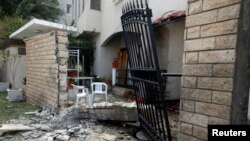Days after militants affiliated with the Islamic State group claimed responsibility for a bomb attack on the residence of the Iranian ambassador in Tripoli, a prominent Libyan lawmaker and former rights activist said Iran has taken an ineffective, hands-off approach regarding his country.
“The Islamic Republic of Iran is a major force in the region. It should play a positive role,” Ali Ramadan Abuzaakouk said in an interview with the Voice of America’s Persian-language Ofogh (Horizon) show.
Dismissing the idea that Iran’s revolutionary leaders had close ties with deposed Libyan dictator Moammar Gadhafi, the Benghazi parliamentarian pointed to Gadhafi’s support and assistance for former Iraqi strongman Saddam Hussein in the eight-year Iran-Iraq war.
The attack on the ambassador's residence came two days after IS claimed responsibility for a double suicide bombing that killed more than 40 people in the eastern town of Qubbah, one of the worst attacks on civilians since a 2011 uprising toppled Gaddafi.
Western powers are concerned that Libya is becoming an active battleground for militants loyal to Islamic State, which controls large areas of Iraq and Syria. Islamist fighters have exploited instability as two rival governments fight for control of territory.
Iran's Foreign Ministry spokeswoman Marzieh Afkham condemned the "terrorist" attack on the ambassador’s residence, which she said caused minor damage to an empty building, and claimed no lives. She called on political rivals in Libya to form a national unity government to end the country's escalating chaos.
Twitter accounts used by IS supporters said the attack was carried out by the group's branch in Tripoli and posted pictures from the site of the explosion.
There was no official statement from the group claiming responsibility for the attack
Abuzaakouk said he condemned the bombing in an appearance outside the Iranian ambassador’s residence in Tripoli right after it occurred. He also downplayed its significance.
“The religious and social conditions in Libya are not conducive to the growth of IS in the country,” the Benghazi MP said.
But Ata'ollah Mohajerani, Minister of Culture and Islamic Guidance of Iran under reformist President Mohammad Khatami, is not so optimistic.
Mohajerani, who currently lives in exile, firmly warned that Tripoli could fall into IS’s hands. Joining Abuzaakouk in the VOA studio, he cited IS’s need for Libya’s vast oil reserves as driving the group’s actions in the country.
The former minister dismissed any talk of equating the conduct of Islamic Republic’s officials with that of IS.
VOA's Mark Snowiss contributed to this report












